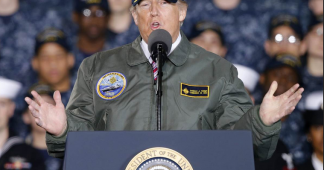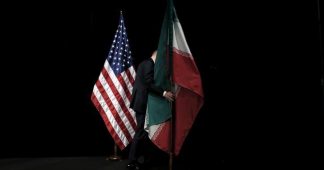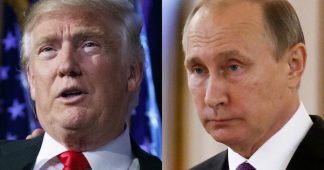By Dimitris Konstantakopoulos
Many people around the globe treat Trump essentially as a clown (they are often those who called upon us to take him seriously before he was elected), in order to dismiss the problem posed by his threats. But every passing day, including with the tax bill he proposed and whose adoption he forced, brings new, ample confirmation that Trump represents one of the most serious threats to humanity which has ever appeared. You may explain what he is doing by advancing any kind of hypothesis about him, if you wish, but what really matters is what Trump is doing, not what you or I believe he is in himself. And what he does is very, very clear and very coherent. It is an extremist pro-finance policy in economics, it is a new, extremist and nuclear version of the neocon program directed against Korea and Iran, and, indirectly, against China and Russia. It is also an attempt to mislead Russia and China about his real intentions (or the intentions of the forces that are able to control and/or manipulate him).
The decision by President Trump, voted by Congress, to drastically reduce business taxes as well as property and income taxes for wealthy Americans has no precedent in US History, even compared with the drastic reduction in taxes instituted by Ronald Reagan. Inevitably, given the international role played by the US economy, it will have very great and very serious economic, social, political, and quite likely geopolitical consequences all over the world. It will exacerbate, at least initially, international economic antagonisms and it threaten, within a time-frame of a few years, to open a new, even more serious chapter in the global economic crisis that began in 2008 (the third crisis of such depth in the history of capitalism after the crises of 1860-70 and 1929, which have been seen as responsible for the two world wars, the revolutions in Russia and China, and German Nazism).
Such are the pressures that Washington exerts with its groundbreaking economic policy (as it does also with its extremely destabilizing and aggressive politics in the Middle and the Far East) that they are being felt intensely even by the most pro-American governments, such as May’s cabinet in London, which is now oriented towards a geopolitically unorthodox approach to China and its ambitious “One Belt, One Road” project. The differences between London and Washington are emerging more and more frequently, such as with the recent support extended by Trump to the British extreme right which, coupled with the fear of major demonstrations against him, led to the indefinite postponement of the US President’s visit to Britain.
Never since passing of the “Ancien Régime” (i.e. the regime overturned by the French Revolution of 1789) have there been measures that would essentially absolve the wealthy from the obligation to pay their taxes, such as Trump has passed in the United States and as Macron is proposing in France. This point was made recently in the “Monde” newspaper by the well known French economist Thomas Piketty.
Trump’s measures were also taken in spite of an emphatic warning from the Finance Ministers of the five strongest countries of the EU (Germany, Britain, France, Italy, Spain) who, in a letter to the US President, pointed out to him, at the beginning of December, the dangers of “trade war” and further deterioration of Washington’s relations with its European allies, already seriously disrupted by America’s policy in the Middle East, the dangers in the Far East and the issue of climate change.
Trump’s measures include, among other things, reduction in corporate taxation by more than a third, from today’s figure of 36.5% to 22.7%. Apart from this reduction, an almost total amnesty will be granted for the repatriated profits of multinationals, company tax on business profits will fall to 25% (at a time when tax on the top wage levels is as high as 40%) and inheritance tax will drop drastically, if it does not practically disappear, for the richest Americans! At the same time, the way in which American multinationals are taxed will change. They will now be taxed only on profits made in the United States.
What will Trump achieve through this?
With this “tax (anti) reform”, Trump achieves two main things.
First, he presents a huge gift to US capitalists, increasing their support for him, something he certainly needs because of the growing attacks on him.
Support of this kind is even more necessary if he wants to go to war and carry out the threats he formulates from time to time, against North Korea, Iran and Venezuela. Second, he improves the relative position of the United States in the globalization system, attracting capital to America through tax dumping, as most other major economies on the planet have higher tax rates. At the same time, of course, he pressures the rest of the world’s economies to follow it in reducing tax, both objectively and by providing a strong argument to forces that want such a policy in any case. Even before Trump’s reform, there were strong pro-capital forces all over the world that anyway were seeking to reduce taxation, now they have one more powerful argument for promoting their agenda.
The question arises as to whether such a policy will be of benefit to the United States economically, just as it remains to be seen how the other economic powers will react.
It is not to be excluded that there will be some temporary acceleration of growth because investment inside the US will increase. But this will be at the expense of the other more or less “allied” countries (such as Britain, France, Italy, Germany) not to mention, of course, the other important economies (China, Russia, etc.)
What is certain is that expenditure cuts will provoke, almost immediately, very serious problems for the US social infrastructure, which in some cases is starting to resemble that of a Third World country and will increase the already explosive social inequalities in the USA. A policy of (at minimum) indirect contraction of already contracted incomes will doubtless increase the relative proportion of demand that will be channeled to….Chinese and other Third World products.
Internationally the Trump measures threaten to reinforce the regime of “globalization” in the effort to mitigate its effects on the USA itself. That is to say, it will increase the power and upgrade the role of the financial capital that is today, in a way, the “government of globalization”. In the short term, if we have a noteworthy increase in investment, it may somewhat mitigate the internal contradictions in the USA (which were largely responsible for Trump’s win), but this will be particularly true of the short term, before painful mid-term effects begin to appear.
But at the same time, as has already begun to occur (we will demonstrate this below), they will inevitably increase the economic tensions in the global system and indirectly reinforce the very serious geopolitical tensions (Middle and Far East, Latin America).
The American president allowed it to be understood pre-electorally that he was an opponent of the financial “oligarchy”, of banks such as Goldman Sachs, but after his election he handed over to the management of this bank, Messrs. Mnuchin and Cohn, the practical economic governance of the USA. At the same time he launched a “war against the poor”, and in particular the (already very limited) rights to health care for Americans that had been introduced by Obama.
One basic outcome of the drastic reduction in taxation (and the social expenditures it finances) will inevitably be an aggravation of the already explosive inequalities within Western societies. Politically this means further shrinkage of any “democratic” content still possessed by the regime of formal “parliamentary democracy”.
Socially, it entails dramatic problems. Economically it means channeling even more resources to a miniscule section of the world’s elite, which either stashes its money in tax havens or consumes luxury products without any particularly beneficial effects for the economy. It is by no means certain that in these circumstances the huge “gifts” to rich Americans will be turned into investments rather than becoming over-accumulation in the Cayman Islands or consumption of hyper-luxury products and it is clear that global demand will contract rather than expand in consequence.
For the social strata enticed by Donald Trump’s pre-electoral demagogy, in conditions of great demand in the US for a “left”, but minimal supply, the coming years may be a period of disappointed expectations.
The international consequences of the “reforms”
All these measures put particular pressure on Germany, as underlined in a recent study by the Centre for European Economic Research and the University of Mannheim. Germany is already under pressure from its EU partners: whereas business taxation amounts to 20% on average, the figure for Germany is 28% to 30%, and so drastic a reduction of tax in the USA poses a much greater threat for the “tax competitiveness” of German companies. Berlin is going to be pressed to respond quickly to this challenge.
In Britain in the meantime, the Prime Minister is considering reducing corporate tax from 20% to 15%, i.e. essentially turning her country into another tax haven!
Rather than being abolished, tax havens are becoming generalized!
The Trump Tax Reform is a new challenge that also highlights the blatant contradiction around which the European Union, and even more so the Eurozone, continues to revolve, due to the method of “selective European construction” it has pursued. It is impossible for the EU with its current structure to cope with the pressures of “globalization” and the increasing economic competition, even if it wants to. Europeans need a state to be able to take measures against foreign competition, but, the only “:state” they have is mainly the EU, which is a state only as far as promoting the interests of the Financial Capital, “liberalizing markets” etc. The other usual features of a state (like common tax policy, a national investment and social policy for instance) simply do not exist.
In Russia President Putin hastened on his part to propose, publicly, the abolition of the 13% tax on repatriated capital. And the Chinese Central Bank, according to the Wall Street Journal, is also preparing its own plan to tackle tax competition, a plan including a combination of tools: higher interest rates, tighter capital controls and more frequent monetary interventions. A Chinese official described the Trump project as a “grey rhino”, a palpable danger for the Chinese economy, and judged that there would be some “tough fights” in the first quarter of 2018.
The South China Morning Post puts forward the view that Trump’s tax reform could trigger a wave of competing tax cuts, globally, for the purpose of attracting capital, something that will affect China strongly. The Prime Minister has already put tax reform on its policy agenda, providing for a huge cut on corporate taxes. Some Chinese companies have indeed moved to the US, partly to avoid high taxes.
The problem is general. As underlined by the New York Times, countries such as Australia, France, Germany and Japan, all of which have a tax on business amounting to at least 30%, will be forced to reduce it. According to Jack Mintz, head of the Public-Policy School at Calgary University, the Canadian forestry industry, energy production, transport and other sectors of the Canadian economy will find themselves in a much more difficult position on account of the Trump tax measures, which threaten the overall direction of Trudeau’s economic and social policy. The Australian Finance Minister has warned that if his country does not change its tax policy, this could cost it 1.5% of its GDP.
The final result of the Trump reforms will be a planet much more unequal, with much reduced benefits for the poorer strata, with lower social and ecological standards, with increased economic competition, with a clear risk of it being transformed into economic, and even genuine, war.
Unfortunately, perhaps, it is only now that mankind will begin to understand the consequences of the 2007-9 crisis, as the various policies contrived to avert them (quantitative easing, the maintenance of practically zero-level interest rates for around a decade, over-indebtedness in public finances, etc.) prove unable to restore even some relatively small, but real, progress in the world economy, while at the same time there is a scandalous lack of social content to the international political agenda.
One might well ask whether Piketty through his parallels with the “Ancien Régime” had simply ascertained that we are moving from our familiar capitalism to a postmodern, techno-neo-feudal regime. This is the direction, anyway, that we are headed in not only with Trump’s “taxation counter-revolution” but also with many other measures such as the gradual abolition of wage labour and its replacement by temporary and “flexible” forms of employment, the drastic reduction of social costs, which was the foundation for a dignified human life in western (and soviet) societies after 1945, and the transformation of the “bourgeois parliamentary regime” into a purely formal and controlled regime.
But shifts of this kind historically have also brought about very great upheavals, such as wars and revolutions.
Also read
The global tax war may already be under way
The Trump (Goldman Sachs) tax plan: More money for the oligarchs
Germany Loses Out in US Tax Reform
Trump, Macron: même combat











